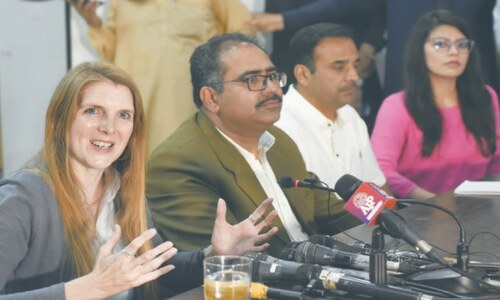ISLAMABAD: Each year, 397,000 young women aged between 15 and 19 years give birth in Pakistan and more than half of them make fewer than the recommended four antenatal care visits and 126,000 do not deliver in a health facility.
Expanding contraceptive services and improving maternal health care for young married women in Pakistan will reduce unintended pregnancies and save precious lives, a study has stated.
The study, ‘Investing in the sexual and reproductive health of adolescents in Pakistan,’ was jointly conducted by Guttmacher Institute and the Population Council. It examines the current needs for contraceptive services for young mothers.
The report quantifies health benefits of investing in contraceptive, maternal health care for young married women aged 15-19 years and provides estimates of the cost of fully meeting these needs.
The findings show that simultaneously expanding both modern contraceptive services and maternal care would not only maximise benefits to women but would also be an efficient use of funds. Currently, of the 461,000 young mothers (15-19) who want to avoid a pregnancy in Pakistan, 364,000 or about three-fourths have an unmet need for modern contraceptives.
Special Assistant to Prime Minister and Convener National Parliamentary Task Force on SDGs MNA Rumina Khurshid Alam at the dissemination ceremony reiterated government’s commitment to population welfare. She stressed the need for increasing health awareness among young people at all levels and greater investment on expanding reproductive health services for adolescents through community midwives and the lady health workers programme.
She said that the findings were released at a very appropriate time and provide strong research-based evidence of how much additional money Pakistan needs for mother and child healthcare and contraceptive care that will guide the government to increase funding in these areas.
“If all needs were met for contraceptive, maternal and newborn, and abortion care for young Pakistani mothers were met, unintended pregnancies would be reduced from 221,000 to 62,000 per year (a 72pc decline), abortions would decrease from 128,000 to 36,000 per year (72pc decline), maternal deaths from 1,020 to 250 per year (76pc). Each year, 397,000 young women (15-19) give birth in Pakistan and more than half of them make fewer than the recommended four antenatal care visits and 126,000 do not deliver in a health facility. The most common causes of maternal deaths among young mothers in Pakistan are hypertension followed by unsafe abortion and hemorrhage,” the findings showed.
The meeting also featured a panel discussion on the importance of investing in adolescents’ reproductive health needs and hosted representatives from civil society, youth leaders and health practitioners.
Published in Dawn, February 7th, 2023














































Dear visitor, the comments section is undergoing an overhaul and will return soon.